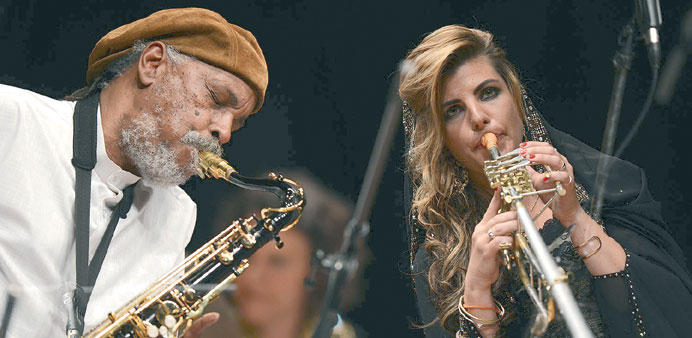By Salman Siddiqui/Staff Reporter
There is always an element of surprise involved when any attempt is made to fuse the music of the East with that of the West. In fact, if not done properly, the experiment can bomb on the big day, no matter how noble the intentions are said to be.
When Desert Bridges, the brainchild of musicians Anna Grichting and Cheo Jeffery Allen Solder, announced that it would organise a concert by calling artists from as far away as US, Austria, Switzerland, India and Syria, nobody knew what kind of music to expect in the end or whether the endeavor would work out at all.
If truth be told, one could feel the nervous energy at the rehearsals at the studio of Katara’s Qatar Music Academy just five days prior to the actual show.
Words of peace, love, unity and humanity were the buzzwords among all the artists present, but when it came to the actual act of playing together as a unit, the uneasiness was visible. A thin red line existed between the various language barriers, cultural differences and individual egos, which if crossed could derail the entire show.
The question before everyone was could music really overcome all these challenges?
When the moment of truth arrived on the night of April 4 at the Qatar National Theatre, the people of Qatar, who themselves belong to a rich and diversified set of backgrounds, including Arabs, Asians and Westerners, were present to give their verdict.
At first, the audience was slightly apprehensive to witness the 11 musicians and a storyteller in strange outfits. The women were dressed in shimmering black dresses and gowns; and the men looked Sufi-like in their attire of pure white shirts and serious unsmiling faces.
But when the music actually began, everything fell into place. The tuba and tabla gelled in; the piano and qanun complimented each other; and the Swiss alphorn blended perfectly with the Oud.
The world, at least the one which had gathered inside the Qatar National Theatre that night, had achieved harmony with the universe, it seemed.
Each artist was given the opportunity to improvise during the two-hour long show. One was treated to a solo on the saxophone in one piece and then the goblet drum in another.
In some instrumentals, original poetry by Cheo Jeffery Allen Solder was narrated accompanied with Arabic translation by the versatile Egyptian storyteller Abeer Soliman.
A very different and absolutely brilliant rendition of ‘fever,’ a song originally written by Eddie Cooley and Otis Blackwell, was also performed, which had everyone tapping their feets. Anna Grichting, who also works as a professor at Qatar University and holds a Phd, crooned “when you put your arms around me, I get a fever that’s so hard to bear” to everyone’s delight.
The real discovery of the show, however, was Amal, the young Qatari singer, who touched everyone’s heart by her impressive vocal range.
A painter was also on stage in one corner, whose brushstrokes were inspired by the music.
The only criticism that some people in the audience had was that maybe it would have been better had the poetry narration been done either completely in English or in Arabic, but not together at the same time, since it was a little hard to catch exactly what was being said.
The show was held with the support of the Swiss embassy and Qatar’s Ministry of Culture. President of the Swiss Council of States (Senate) Filippo Lombardi and Swiss Ambassador Martin Aeschbacher were among those who attended the event.
US-based composer and pianist Frank Wilkins, who was also the musical director of the show, said that what they managed to achieve was ‘simply wonderful’ given that the musicians had very little time to jam.
“The show was all about bringing love and spreading the message of peace, and I think we managed to do that here,” he said.
1. A standing ovation from the audience at the end of the concert.

Cheo Jeffery Allen Solder on the saxophone and Eliana Burki on the alphorn.
